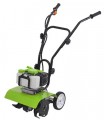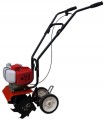Working depth
The maximum working depth provided by the unit. In cultivators with non-replaceable cutters, this parameter is determined primarily by the diameter of the cutter, in walk-behind tractors designed for active cutters (see below) - by design features (in such models, even high power does not guarantee a large working depth). The most limited indicator in modern walk-behind tractors is
up to 20 cm, and a value
from 21 to 25 cm can be called small. However, often even such opportunities are quite enough. Depth from
26 to 30 cm already provides quite extensive opportunities, and the most advanced models are able to “bite into the ground”
by more than 30 cm.
Be that as it may, the optimal depth of processing depends on the type and condition of the soil, as well as the crops for which the soil is being prepared; detailed recommendations on this subject can be found in special sources. So it does not always make sense to look for a model with maximum depth - especially since such capabilities require high power. Also note that in many units the depth can be adjusted.
Engine size
The working volume of the gasoline or diesel engine of the cultivator / two-wheel tractor. For an internal combustion engine of the same type (see "Type of internal combustion engine"), power and fuel consumption usually directly depend on the volume. Also, the classification of a two-wheel tractor as a vehicle according to the traffic rules of a particular country may depend on the engine volume; you should pay attention to this if you plan to use the unit as a tractor and drive on roads.
Motor power
Engine power of the cultivator / walk-behind tractor in horsepower. The basic unit of power these days is the watt, but gasoline and diesel engines (see "Engine type") often use the more traditional horsepower designation. 1 hp is approximately equal to 735 watts.
A more powerful engine allows you to achieve higher productivity, width and depth of processing. On the other hand, high power significantly affects the price, weight and dimensions of the unit, as well as electricity / fuel consumption. In light of this, the characteristics of the engine are selected by the manufacturer, taking into account which “weight category” the walk-behind tractor belongs to. The most limited modern units have a power
of up to 2 hp., in the most severe and advanced, this figure can
exceed 13 hp. ;
4 - 7 HP can be called an average, and
2 - 4 hp. and
7 - 13 hp respectively below and above average.
Detailed recommendations on the optimal power for a particular situation can be found in special sources.
Motor power
Motor block / cultivator engine power in watts. This designation is normally used for electric engines, but can also be used for gasoline/diesel engines, along with horsepower (for these, see Engine Power above).
A more powerful engine allows you to achieve higher productivity, width and depth of processing. On the other hand, high power significantly affects the price, weight and dimensions of the unit, as well as electricity / fuel consumption. In light of this, the engine power is selected by the manufacturer, taking into account which “weight category” the walk-behind tractor belongs to, what characteristics it should show. So, the lightest models have a power
of up to 1.5 kW, just such a device is best suited for a small area of 6 - 8 acres. Motoblocks
up to 3 kW are already able to cope with 10 - 15 acres, a power of
3.5 - 5 kW is suitable for a plot from 50 acres to a couple of hectares. Units
for 5 - 10 kW already belong to the professional level, they are "too tough" open spaces of 7 - 10 hectares; and the heaviest and most powerful modern walk-behind tractors have a power
of more than 10 kW.
Fuel consumption
The average amount of fuel consumed by the gasoline or diesel engine (see "Engine type") of the cultivator/two-wheel tractor per hour of operation. This value is rather conditional, because depending on the mode of operation, fuel consumption may vary in one direction or another; however, in general, it provides an estimate of the approximate amount of fuel required for a given operating time.
Fuel tank volume
The volume of the fuel tank of the cultivator / two-wheel tractor; knowing this parameter and fuel consumption (see above), it is possible to determine the maximum operating time of the unit on a single refill. If you plan to use the device in large areas or to work for a long time, it makes sense to look for a model with a large tank — it will not have to be filled often. On the other hand, for short-term work in small areas, a large tank is not required — in this case, it only increases the weight and dimensions of the unit.

